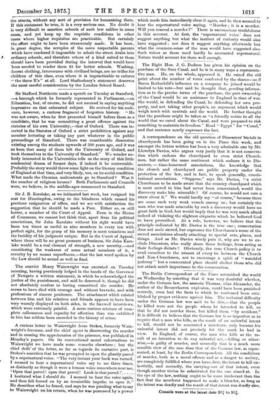The Berlin Correspondent of the Times astonished the world on
Wednesday by asserting that it was very doubtful whether, under the German law, the assassin Thomas, alias Alexander, the author of the Bremerhaven explosion, could have been punished severely, even had the facts to which he confessed been esta- blished by proper evidence against him. The technical difficulty under the German law was said to be this,—that the people he killed were not the people whom he intended to kill, so that he did not murder them, but killed them "by accident." It is difficult to believe that the German law is so imperfect as to require that a man who kills, as the result of an unlawful intent to kill, should not be accounted a murderer, only because his unlawful intent did not precisely hit the mark he had in view. In England, of course, the man who kills as the re- sult of an intention to do any unlawful act,—killing or other- wise,—is guilty of murder, and assuredly that is a much more sensible view of the case than that of the German law, as repre- sented, at least, by the Berlin Correspondent. All the conditions. of murder, both as a moral offence and as a danger to society, are completely fulfilled where you have, first, the intent to kill un- lawfully, and secondly, the carrying-out of that intent, even though another victim be substituted for the one aimed at In the eye of the law, nothing ought to be more irrelevant than the fact that the murderer happened to make a blunder, so long as the intent was deadly and the result of that intent was deadly also.


































 Previous page
Previous page